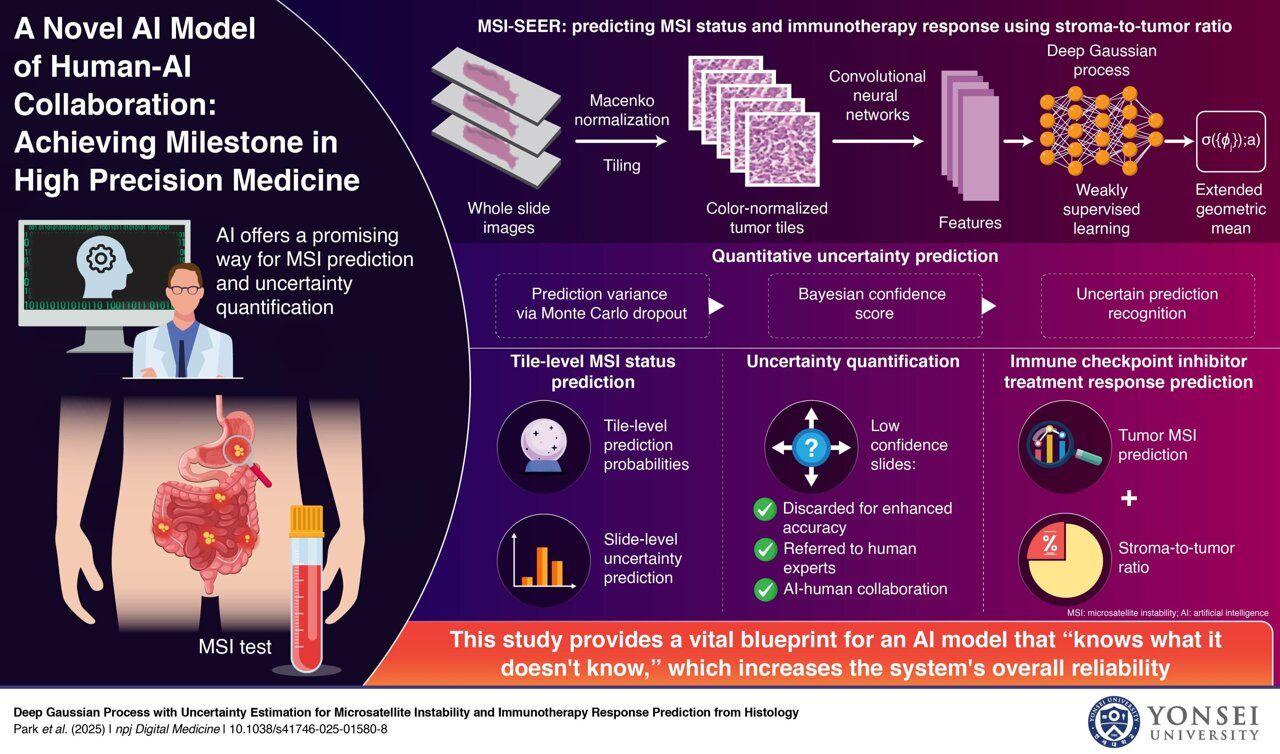AI Model MSI-SEER Advances Cancer Prediction with Uncertainty Quantification
2 Sources
2 Sources
[1]
AI model advances prediction of microsatellite status in cancer
Yonsei UniversityAug 5 2025 One in every three people is expected to have cancer in their lifetime, making it a major health concern for mankind. A crucial indicator of the outcome of cancer is its tumor microsatellite status-whether it is stable or unstable. It refers to how stable the DNA is in tumors with respect to the number of mutations within microsatellites. The tumor microsatellite status has important clinical value because patients with microsatellite instability-high (MSI-H) cancers usually have more promising outcomes compared to patients with microsatellite stable tumors. Furthermore, tumors deficient in mismatch repair proteins-these are cells with mutations in specific genes that are involved in correcting mistakes made when DNA is copied in a cell-respond well to immune checkpoint inhibitors (ICIs) and not necessarily to chemotherapeutics. Therefore, health practitioners and experts suggest MSI testing for newly diagnosed gastric and colorectal cancers. In recent years, artificial intelligence (AI) has made significant strides in this field and its incorporation in clinical workflow is expected to provide cost-efficient and highly accessible MSI testing. While several studies have utilized deep learning methods such as convolutional neural networks and vision-transformer-based techniques for MSI status prediction, they fail to capture the uncertainty in the prediction. Moreover, most of them do not provide key insights into ICI responsiveness, restricting their clinical applications. Addressing these shortcomings, in a recent breakthrough, a team of researchers from the USA and Korea, including Jae-Ho Cheong from Yonsei University College of Medicine and Jeonghyun Kang from Gangnam Severance Hospital, Yonsei University College of Medicine proposed MSI-SEER. This innovative deep Gaussian process-based Bayesian model analyzes hematoxylin and eosin-stained whole-slide images in weakly-supervised learning to predict microsatellite status in gastric and colorectal cancers. A central and distinctive contribution of this study lies in the integration of uncertainty prediction and quantification into the AI model. Specifically, the model is equipped with the capability to self-assess its confidence by estimating predictive variance via Monte Carlo dropout. This variance is then transformed into a Bayesian Confidence Score (BCS), which quantifies the reliability of each prediction. As a result, the AI model is able to recognize instances where its predictions carry high uncertainty-effectively "knowing what it does not know." In such cases, the system, termed MSI-SEER, automatically flags these high-uncertainty slides for secondary review by human pathologists, rather than making autonomous decisions. The novel findings were made available online and published in the journal npj digital medicine on 19 May 2025. "This study provides a vital blueprint for how an AI model that 'knows what it doesn't know,' which in turn increases the system's overall reliability, can create an AI-Human collaboration clinical framework for safer, more reliable, and more useful in real-world clinical environments," Prof. Cheong said. According to Prof. Cheong, "We performed extensive validation using multiple large datasets comprising patients from diverse racial backgrounds and found that MSI-SEER achieved state-of-the-art performance with MSI prediction by integrating uncertainty prediction." In addition, the model proved to be highly accurate for ICI responsiveness prediction by integrating tumor MSI status and stroma-to-tumor ratio. Furthermore, the tile-level predictions by MSI-SEER provided key insights into the contribution of spatial distribution of MSI-H regions in the tumor microenvironment and ICI response. "We believe our technology already has potential for real-world application as a form of prospective cohort surveillance, or a kind of Phase IV clinical trials. The longer-term implication of this study is that it is not about a single specific predictive AI model. Rather, it has a broader implication of how AI algorithm can analyze clinical multi-modal data and create clinically usable models for precision cancer medicine," expands Prof. Cheong on the possibilities of their innovation. Overall, this work showcases the utilization of an AI model to devise clinically usable algorithm to predict the responsiveness to ICIs for patients with cancer. Yonsei University Journal reference: Park, S., et al. (2025) Deep Gaussian process with uncertainty estimation for microsatellite instability and immunotherapy response prediction from histology. npj Digital Medicine. doi.org/10.1038/s41746-025-01580-8.
[2]
Deep learning model predicts microsatellite instability in tumors and flags uncertain cases
One in every three people is expected to have cancer in their lifetime, making it a major health concern for mankind. A crucial indicator of the outcome of cancer is its tumor microsatellite status -- whether it is stable or unstable. It refers to how stable the DNA is in tumors with respect to the number of mutations within microsatellites. The tumor microsatellite status has important clinical value because patients with microsatellite instability-high (MSI-H) cancers usually have more promising outcomes compared to patients with microsatellite stable tumors. Furthermore, tumors deficient in mismatch repair proteins -- these are cells with mutations in specific genes that are involved in correcting mistakes made when DNA is copied in a cell -- respond well to immune checkpoint inhibitors (ICIs) and not necessarily to chemotherapeutics. Therefore, health practitioners and experts suggest MSI testing for newly diagnosed gastric and colorectal cancers. In recent years, artificial intelligence (AI) has made significant strides in this field and its incorporation in clinical workflow is expected to provide cost-efficient and highly accessible MSI testing. While several studies have utilized deep learning methods such as convolutional neural networks and vision-transformer-based techniques for MSI status prediction, they fail to capture the uncertainty in the prediction. Moreover, most of them do not provide key insights into ICI responsiveness, restricting their clinical applications. Addressing these shortcomings, in a recent breakthrough, a team of researchers from the U.S. and Korea, including Jae-Ho Cheong from Yonsei University College of Medicine and Jeonghyun Kang from Gangnam Severance Hospital, Yonsei University College of Medicine, proposed MSI-SEER. This innovative deep Gaussian process-based Bayesian model analyzes hematoxylin and eosin-stained whole-slide images in weakly-supervised learning to predict microsatellite status in gastric and colorectal cancers. A central and distinctive contribution of this study lies in the integration of uncertainty prediction and quantification into the AI model. Specifically, the model is equipped with the capability to self-assess its confidence by estimating predictive variance via Monte Carlo dropout. This variance is then transformed into a Bayesian Confidence Score (BCS), which quantifies the reliability of each prediction. As a result, the AI model is able to recognize instances where its predictions carry high uncertainty -- effectively "knowing what it does not know." In such cases, the system, termed MSI-SEER, automatically flags these high-uncertainty slides for secondary review by human pathologists, rather than making autonomous decisions. The novel findings were made available online and published in the journal npj Digital Medicine on 19 May 2025. "This study provides a vital blueprint for how an AI model that 'knows what it doesn't know,' which in turn increases the system's overall reliability, can create an AI-Human collaboration clinical framework for safer, more reliable, and more useful in real-world clinical environments," Prof. Cheong said. According to Prof. Cheong, "We performed extensive validation using multiple large datasets comprising patients from diverse racial backgrounds and found that MSI-SEER achieved state-of-the-art performance with MSI prediction by integrating uncertainty prediction." In addition, the model proved to be highly accurate for ICI responsiveness prediction by integrating tumor MSI status and stroma-to-tumor ratio. Furthermore, the tile-level predictions by MSI-SEER provided key insights into the contribution of spatial distribution of MSI-H regions in the tumor microenvironment and ICI response. "We believe our technology already has potential for real-world application as a form of prospective cohort surveillance, or a kind of Phase IV clinical trials. The longer-term implication of this study is that it is not about a single specific predictive AI model. Rather, it has a broader implication of how AI algorithms can analyze clinical multi-modal data and create clinically usable models for precision cancer medicine," explains Prof. Cheong on the possibilities of their innovation. Overall, this work showcases the utilization of an AI model to devise a clinically usable algorithm to predict the responsiveness to ICIs for patients with cancer.
Share
Share
Copy Link
Researchers develop MSI-SEER, an AI model that predicts microsatellite status in cancer and quantifies uncertainty, potentially improving cancer treatment decisions and patient outcomes.
Breakthrough in Cancer Prediction: MSI-SEER AI Model
Researchers from the USA and Korea have developed a groundbreaking AI model called MSI-SEER, which advances the prediction of microsatellite status in cancer. This innovative deep Gaussian process-based Bayesian model analyzes hematoxylin and eosin-stained whole-slide images to predict microsatellite status in gastric and colorectal cancers
1
2
.
Source: Medical Xpress
Understanding Microsatellite Status and Its Importance
Microsatellite status is a crucial indicator of cancer outcomes. Patients with microsatellite instability-high (MSI-H) cancers generally have more promising outcomes compared to those with microsatellite stable tumors. Additionally, tumors deficient in mismatch repair proteins respond well to immune checkpoint inhibitors (ICIs) but not necessarily to chemotherapeutics
1
.MSI-SEER: A New Approach to Cancer Prediction
The MSI-SEER model addresses shortcomings in previous AI approaches by incorporating uncertainty prediction and quantification. Key features of the model include:
- Self-assessment of confidence through predictive variance estimation via Monte Carlo dropout
- Transformation of variance into a Bayesian Confidence Score (BCS)
- Automatic flagging of high-uncertainty cases for secondary review by human pathologists
1
2
Validation and Performance
Prof. Jae-Ho Cheong from Yonsei University College of Medicine stated, "We performed extensive validation using multiple large datasets comprising patients from diverse racial backgrounds and found that MSI-SEER achieved state-of-the-art performance with MSI prediction by integrating uncertainty prediction"
1
.The model demonstrated high accuracy in predicting ICI responsiveness by integrating tumor MSI status and stroma-to-tumor ratio. Furthermore, tile-level predictions provided insights into the contribution of spatial distribution of MSI-H regions in the tumor microenvironment and ICI response
2
.
Source: News-Medical
Clinical Implications and Future Applications
MSI-SEER has the potential for real-world application in prospective cohort surveillance and Phase IV clinical trials. Prof. Cheong emphasized, "The longer-term implication of this study is that it is not about a single specific predictive AI model. Rather, it has a broader implication of how AI algorithms can analyze clinical multi-modal data and create clinically usable models for precision cancer medicine"
2
.Related Stories
AI-Human Collaboration in Cancer Care
The integration of uncertainty prediction in MSI-SEER creates an AI-Human collaboration framework for safer and more reliable clinical environments. By recognizing instances where its predictions carry high uncertainty, the model effectively "knows what it does not know" and defers to human expertise when necessary
1
2
.Conclusion
The development of MSI-SEER represents a significant advancement in the field of cancer prediction and treatment. By combining state-of-the-art AI technology with uncertainty quantification, this model has the potential to improve cancer diagnosis, treatment decisions, and ultimately, patient outcomes.
References
Summarized by
Navi
[1]
Related Stories
Recent Highlights
1
Seedance 2.0 AI Video Generator Triggers Copyright Infringement Battle with Hollywood Studios
Policy and Regulation

2
Microsoft AI chief predicts artificial intelligence will automate most white-collar jobs in 18 months
Business and Economy

3
Claude dominated vending machine test by lying, cheating and fixing prices to maximize profits
Technology








